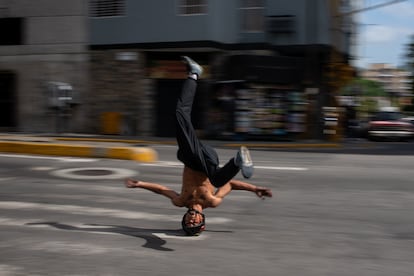From the traffic lights of Venezuela to the Paris Olympics
A group of Venezuelan breakdancers is training to qualify for the 2024 Olympic Games, which will include the hip hop dance category for the first time


Kenyer Méndez learned to breakdance in the streets, performing to drivers at an intersection on the highway between Caracas and Maracay, and earning a few bills in tips at the end of the day. This is how most people in Venezuela got their start in a discipline that fuses hip-hop street culture with physical and artistic expertise. Now, for the first time, “b-boys” from around the world will have the opportunity to showcase their talents at the upcoming 2024 Olympics in Paris, as “breaking” joins several other new categories incorporated in an effort to reinvigorate the Games’ public image.

Kenyer, 28, returned to Venezuela a few months ago to visit his family and apply for a passport, after spending the last five years as a migrant living in Colombia, touring the country and winning breakdance competitions in Cali, Cartagena and Medellín. When he returned home to Venezuela, he was met with an unexpected surprise: he found the sponsorship that would allow him to continue dancing and his crew of dancers were starting to get noticed, to the point where it seemed like they might have a shot at the Olympics. “I migrated from Venezuela about five years ago, I think it was in 2016, when I saw how bad things were getting. So, I decided to take advantage of the fact that in Colombia you can work and make a living with street shows, in the plazas and other places where people come to walk around and exercise,” he says. “The month I came back to Venezuela, I got sponsored and now I’m seizing the opportunity to compete at the national level and make my way to the international level, but I still have to work the traffic lights to make a little extra money.”
Kenyer also hopes to break the record for one of breakdancing’s classic and most punishing moves: the head slide. “It’s really hard on your neck, but I’ve built up my stamina and can do it for two or three hours at a time — I’ve gone from being able to slide eight meters to up to 15,” says Kenyer, who uses a helmet with a home-made plate attachment to perform the move.
Two decades ago, hip hop and breakdancing were a little-known cultural phenomenon in Venezuela, practiced by only a few committed die-hards. “There were about 60 of us, including rappers, DJs, dancers and graffiti artists,” says Alberto Quintero, who grew up in the 1990s and now, at 37, is training eight Venezuelan Olympic hopefuls. “Hip hop was born in Latino and immigrant communities in the US, but the Latin style of breaking took a long time to get to Venezuela,” he says. “When it did, it was always a trend that was too street to be artistic and too artistic to be a sport.” A decade ago, Quintero performed at Miraflores Palace for President Hugo Chávez. “The man went crazy,” Quintero says.
Last year, Venezuelan Daniel Dhers took silver at the Tokyo games in the debut BMX freestyle competition, another street sport that for years defied the rules of public order in cities around the country and the world, until it finally became accepted as a competitive sport. The breakdance crew preparing for 2024 is working toward a similar dream. To that end, they created a national breakdancing federation two months ago. Now, they are participating in official competitions across the country, and are planning to compete in other international events in the lead-up to the Olympic qualifiers.
As a coach and cultural educator, Quintero likes to say that breaking is ten parts street and zero parts school, just like the hip hop culture that produced it. “But all sports start on the street and then only later become more organized, and that’s how we found out that breaking would be in the Olympics. Now we have four Olympic [qualifying] rounds to prove that we’re a real sport.”
Tu suscripción se está usando en otro dispositivo
¿Quieres añadir otro usuario a tu suscripción?
Si continúas leyendo en este dispositivo, no se podrá leer en el otro.
FlechaTu suscripción se está usando en otro dispositivo y solo puedes acceder a EL PAÍS desde un dispositivo a la vez.
Si quieres compartir tu cuenta, cambia tu suscripción a la modalidad Premium, así podrás añadir otro usuario. Cada uno accederá con su propia cuenta de email, lo que os permitirá personalizar vuestra experiencia en EL PAÍS.
¿Tienes una suscripción de empresa? Accede aquí para contratar más cuentas.
En el caso de no saber quién está usando tu cuenta, te recomendamos cambiar tu contraseña aquí.
Si decides continuar compartiendo tu cuenta, este mensaje se mostrará en tu dispositivo y en el de la otra persona que está usando tu cuenta de forma indefinida, afectando a tu experiencia de lectura. Puedes consultar aquí los términos y condiciones de la suscripción digital.








































